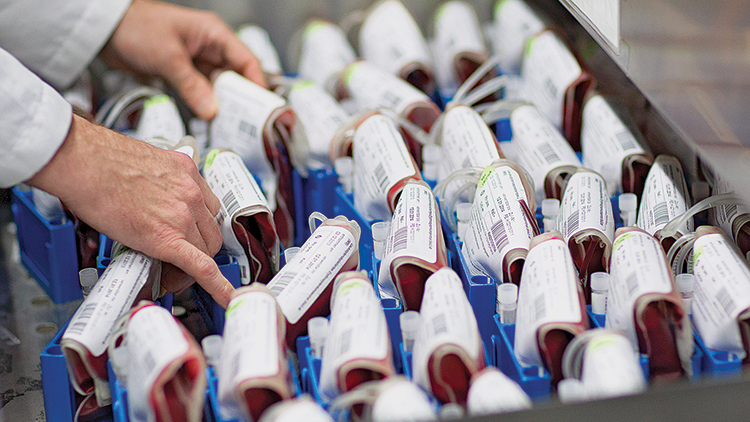How economics can put a price on life
Economics is so mainstream, we can put a value on a kidney, and even the donor’s worth
Friso Gentsch/dpa/Corbis
Share

In 2006, economist Nicholas Stern made a series of alarming predictions, in a report commissioned by the British government, of the potential results of a worsening climate. Among them were the extinction of up to 40 per cent of all species, 200 million climate refugees—many of them ominously gathered on Europe’s collective lawn—and “an average reduction in global per capita consumption of at least five per cent, now and forever.” Stern has been roundly berated in the media ever since, particularly over the refugee projection, but the actual debate in the media was waged over the five per cent, and whether he exaggerated the cost of acting in the future while underestimating the cost of acting in the present.
For Philip Roscoe, professor of management at St. Andrews University in Scotland and author of the evocatively titled I Spend, Therefore I Am: How Economics Has Changed the Way We Think and Feel, the response to Stern was a perfect example of his book’s target: the triumph of the economic model. Once Stern introduced his own calculator and slide rule into his projections the argument could only be engaged on those terms: There is no market price for species extinction or massive refugee influx, so there was, in effect, no argument to be had. After a half century of measuring everything in dollars and cents and proclaiming how financial incentives control all behaviour, Roscoe says, “We lack the language to understand or even talk about issues in any other way.” What’s more, economic speech brings into existence what it postulates: “human beings as self-interested, calculative and even dishonest entrepreneurs of the self.”
Literally. Roscoe sees the reach of the economic model of humanity in the way suffering dictated by economic policy—the effect of the austerity program in Greece, say—is seen as “the wrath of God—inevitable, and in its inscrutable way, just.” But also, eight years after Stern, in the appearance of theoretical and even actual markets in human body parts.
Economic thinking—especially about private property—and notions of personal autonomy are closely intertwined, notes Roscoe. Autonomy is perhaps Western civilization’s supreme value today, the flashpoint between its prevailing secularism and its traditional religious faith. That quarrel has played out for more than half a century in a host of sexual issues, and more recently, in the growing acceptance of our right to die when we choose. Arguments against it that boil down to a gut feeling of ?“because it’s wrong” no longer have any traction. “Paternalism is the greatest of crimes,” says Roscoe.
And if death is an individual choice, a market in organs—a legal one, that is, for a black market already exists—may be inevitable. Roscoe suspects so, even as he marshals powerful counter-arguments. To start, he notes, there’s no reason to believe a legal market would not mimic the illegal one, in which, as he quotes an anthropologist working for the anti-traffcking organization Organwatch, kidneys flow “from south to north, from east to west, from poorer to more affluent bodies, from black and brown bodies to white ones, from female to male.” In Iran, the only country on Earth where selling organs is legal, the poverty of the sellers makes follow-up care rare for most, leaving them weak, unable to work and even more impoverished. “So what?” is the market absolutist’s response. It merely stands to reason that sellers would be poor and buyers rich—who are we to strip away the individual’s choice? Especially when the demand is so high.
Yet it’s a fallacy to think an open market would bring a supply equal to demand, Roscoe says. Consider the blood market, where paying for blood seems to have transformed rather than expanded the supply chain. “Blood sales, where legal, have tended to slow blood donations. They don’t wipe out the latter, though, so they don’t shrink supply, but blood sales don’t increase supply by as much as you’d assume, either. The California plasma market now works well, with regular sellers, but when it started it had lower-quality suppliers and higher monitoring costs.”
And that is where Roscoe feels himself falling into the very abyss he sought to avoid. Did he just make an economic argument against the monetization of human bodies? Once you’ve arrived at opposing an organ market because it would increase transplant costs, you’ve joined a continuum that includes those trying to establish a baseline price for organs. One American economist has made calculations—arbitrary, in Roscoe’s opinion—for the $15,200 price tag he believes would match up supply and demand: $7,500 for “risk of reduced quality of life,” about $3,000 for a month’s lost earnings during recovery and $5,000 for risk of death. Note particularly the income cut-off, Roscoe says—the model assumes those earning more than $36,000 a year wouldn’t be interested. The debate, he predicts, will focus on that sort of question—“how much?”—and not on “should we?”